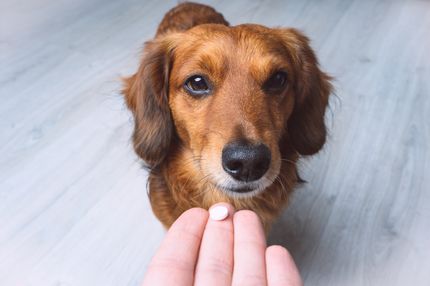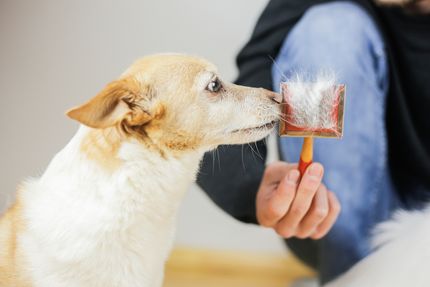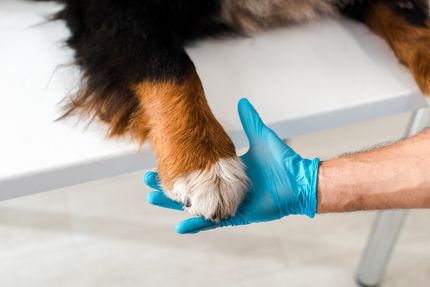Deworming in dogs
Parasites such as worms that infest dogs are annoying but completely normal problems in life with free-roaming pets. Symptoms often only occur with more advanced infestations. Dogs slip on their bottoms, clear their throats and swallow immediately (called "backwards sneezing"), and develop diarrhea or coat problems. How dogs get infected, what helps against worms and if they are also a danger for you as a dog owner, you can read below.
How does a dog get infected with worms?
An infection with worms, explained using the example of roundworm, proceeds as follows:
- by sniffing excrements, ingesting them or successfully hunting small rodents, the eggs or larvae of the worm enter your dog's organism
- through the intestines they reach the liver where they hatch or shed their skin again
- through the bloodstream they reach the lungs, where they mature for a while
- the larvae crawl through the trachea to the larynx, trigger a cough reflex and are either spit out or swallowed
- in the intestine they become adults; from now on females lay up to 200,000 eggs a day
- the eggs are excreted with the feces and ingested by other animals; severe worm infestation causes itching, which also promotes the spread of the eggs.
In the case of low infestation, an infection with worms often does not have serious consequences, however, especially in puppies, seniors or chronically ill animals, a worm infection can develop into a serious problem. If left untreated, worms can destroy internal organs and cause the dog to lose weight.
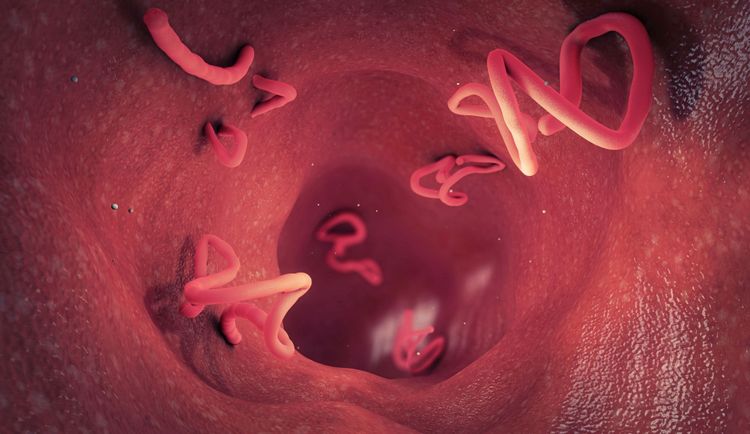
How does deworming work in dogs?
Depending on whether you want a fecal examination in advance, it will first be determined whether worm eggs or segments can be found in the droppings of your dog. This can be useful, since a fecal examination costs only slightly more than deworming tablets for dog.
Dewormers are available as tablets (Milbemax for dogs - more details later!) or paste (Banminth), the latter is more commonly taken for puppies. The treatment is very simple: the tablet or paste is given directly to the dog, according to its age and weight. Within 24 hours all worms in the body die. Sometimes diarrhea occurs during this period, but this is not a negative reaction to the medication, but a side effect that occurs when the dead worms are excreted. The diarrhea should subside within two days.
Can worm infestation be prevented?
This can be answered quite simply: No. A worming treatment cannot protect dogs from reinfection. It only kills the worms that are in your dog's body at the time it is given. If your dog eats another mouse or foreign excrement the next day, he may already be reinfected. Worming treatments for dogs do not have a depot effect.
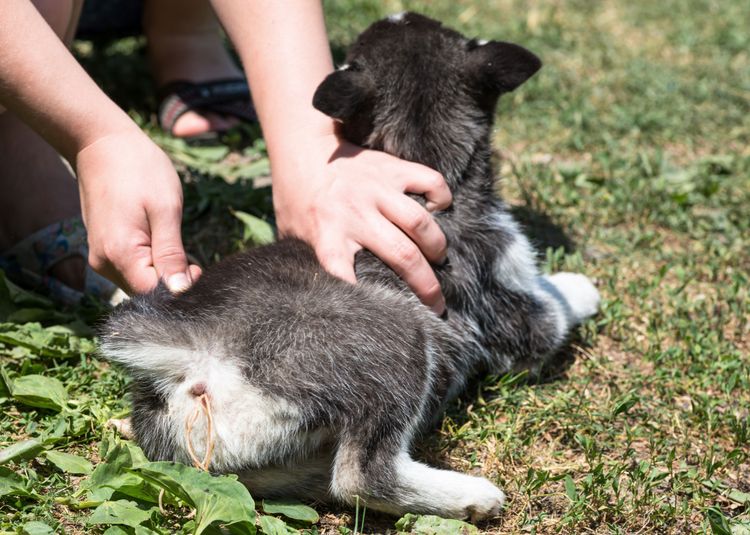
Milbemax - An effective remedy in the fight against worms in dogs.
When it comes to the health of our four-legged friend, we want to make sure they are well protected. One of the most common health concerns in dogs is worm infestations. Fortunately, there are products like Milbemax that can help manage this threat.
What is Milbemax?
Milbemax is an antiparasitic that is used to treat and control worm infestations in dogs. It is a tablet that is administered orally and is effective against a variety of worms, including heartworms, roundworms, tapeworms and hookworms. This makes Milbemax a comprehensive solution for worm infestations in dogs.
The advantages of Milbemax
- Broad spectrum of activity: a key benefit of Milbemax is its ability to control a wide range of worms. Whether your dog is suffering from a tapeworm, roundworm, hookworm or heartworm infestation, Milbemax is an effective way to treat and control these parasites.
- Easy to use: Milbemax comes in the form of a small tablet that is easy to administer. You can either put the tablet directly in your dog's mouth or mix it with his food. It's also worth noting that Milbemax only needs to be administered once a month, which simplifies treatment and increases the likelihood that your dog will receive the full dose.
- Safety and Tolerability: Milbemax is safe for puppies two weeks of age and older and weighing at least 0.5 kg. It has also been shown to be safe for pregnant and lactating bitches. It is also well tolerated and rarely causes side effects.
Directions for use of Milbemax
While Milbemax is a safe and effective product, it is important to follow proper dosage. Dosage will vary depending on the weight of your dog. Therefore, you should always follow the manufacturer's or your veterinarian's instructions.
When it comes to your dog's health, it is important to pay attention to worm prevention and control. Milbemax offers a comprehensive solution for the treatment and control of worms in dogs. With its ease of use and effectiveness against a wide range of worms, Milbemax is an excellent choice for ensuring your dog's health. Always remember that regular veterinary checkups and proper parasite control are essential to keeping your four-legged friend healthy.
How often should a dog get a worming treatment?
For adult dogs, veterinarians advise regular deworming about every three months. Puppies should be dewormed much more often, as they can become infected through their mother's milk while still in the womb and after birth. At two weeks of age and then at two-week intervals, you should deworm puppies until they are no longer receiving their mother's milk. After that, deworming is best done once a month until the puppies are six months old. Before that, even fecal testing instead of giving the medicine is not an option.
Is worm infestation transmissible to humans?
Basically yes. Worms that infect your dog can also survive in your body. Under normal hygienic conditions, an infection with worms is very unlikely, but especially small children are at risk. Not only do they still very often put their fingers in their mouths, no matter what they have touched before, but their body size also invites many dogs to lick their faces, which can also promote infection. So if you have contact with small children, be sure to deworm your dogs regularly or have them tested for worms.
In addition, you should always deworm all animals in the household. Cats living in the same household should also be dewormed.





































